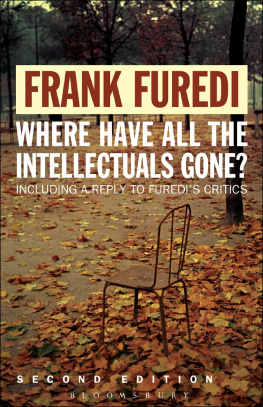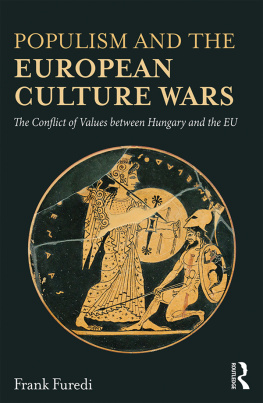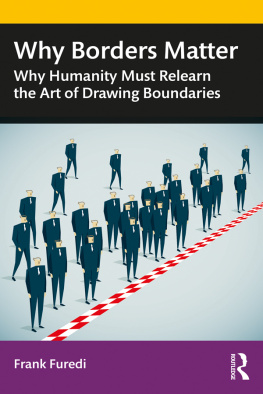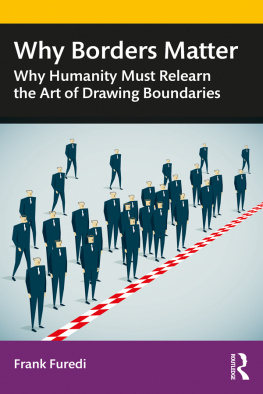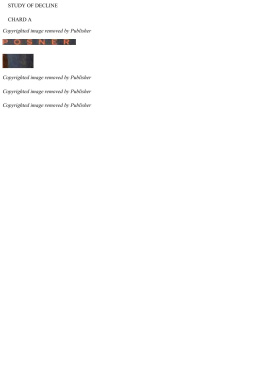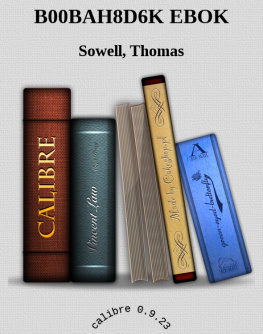Frank Furedi - Where Have All the Intellectuals Gone?: Confronting 21st Century Philistinism
Here you can read online Frank Furedi - Where Have All the Intellectuals Gone?: Confronting 21st Century Philistinism full text of the book (entire story) in english for free. Download pdf and epub, get meaning, cover and reviews about this ebook. year: 2006, publisher: Continuum, genre: Politics. Description of the work, (preface) as well as reviews are available. Best literature library LitArk.com created for fans of good reading and offers a wide selection of genres:
Romance novel
Science fiction
Adventure
Detective
Science
History
Home and family
Prose
Art
Politics
Computer
Non-fiction
Religion
Business
Children
Humor
Choose a favorite category and find really read worthwhile books. Enjoy immersion in the world of imagination, feel the emotions of the characters or learn something new for yourself, make an fascinating discovery.
- Book:Where Have All the Intellectuals Gone?: Confronting 21st Century Philistinism
- Author:
- Publisher:Continuum
- Genre:
- Year:2006
- Rating:4 / 5
- Favourites:Add to favourites
- Your mark:
- 80
- 1
- 2
- 3
- 4
- 5
Where Have All the Intellectuals Gone?: Confronting 21st Century Philistinism: summary, description and annotation
We offer to read an annotation, description, summary or preface (depends on what the author of the book "Where Have All the Intellectuals Gone?: Confronting 21st Century Philistinism" wrote himself). If you haven't found the necessary information about the book — write in the comments, we will try to find it.
Where Have All the Intellectuals Gone?: Confronting 21st Century Philistinism — read online for free the complete book (whole text) full work
Below is the text of the book, divided by pages. System saving the place of the last page read, allows you to conveniently read the book "Where Have All the Intellectuals Gone?: Confronting 21st Century Philistinism" online for free, without having to search again every time where you left off. Put a bookmark, and you can go to the page where you finished reading at any time.
Font size:
Interval:
Bookmark:
Second Edition
Also available from Bloomsbury:
Culture of Fear (revised edition), Frank Furedi
Politics of Fear, Frank Furedi
Killing Thinking: Death of the University, Mary Evans
Mass Media in a Mass Society: Myth and Reality, Richard Hoggart
Second Edition
Including A Reply to My Critics
Frank Furedi

Bloomsbury Academic
An imprint of Bloomsbury Publishing Plc
50 Bedford Square | 1385 Broadway |
London | New York |
WC1B 3DP | NY 10018 |
UK | USA |
www.bloomsbury.com
Bloomsbury is a registered trade mark of Bloomsbury Publishing Plc
Frank Furedi, 2004
Frank Furedi has asserted his right under the Copyright,
Designs and Patents Act, 1988, to be identified as Author of this work.
All rights reserved. No part of this publication may be reproduced or transmitted in any form or by any means, electronic or mechanical, including photocopying, recording, or any information storage or retrieval system, without prior permission in writing from the publishers.
No responsibility for loss caused to any individual or organization acting on or refraining from action as a result of the material in this publication can be accepted by Bloomsbury or the author.
British Library Cataloguing-in-Publication Data
A catalogue record for this book is available from the British Library.
ISBN: PB: 978-0-8264-9096-4
ePUB: 978-1-4411-6348-6
ePDF: 978-1-4411-9118-2
Library of Congress Cataloging-in-Publication Data
A catalog record for this book is available from the Library of Congress
Contents
Preface
For some time now I have been disturbed by the profound sense of intellectual disorientation that appears to afflict many of our cultural institutions, universities and schools. The public deserves a high quality of intellectual debate from our cultural institutions and, as an audience with infinite potential, should command far greater respect. This book is written for the many intelligent men and women who aspire to a more challenging intellectual and cultural life.
The ideas presented in Where Have All the Intellectuals Gone? were developed through a protracted conversation with friends and colleagues. The steady stream of correspondence that I received in response to my articles on the university in The Times Higher Education Supplement helped convince me that many others shared my concerns. Discussions with friends in the United States suggested that institutional dumbing down was not merely a British problem. An important conference on the Public Intellectual organized by the Institute of Ideas in London during the summer of 2003 helped reorient this study towards an exploration of the wider question of cultural politics.
Throughout the course of writing this book I received constant feedback and criticism from Josie Appleton. For better or worse, she is responsible for the direction of many of my arguments. I also gained many insights from the input made by two Institute of Ideas stalwarts, Tiffany Jenkins and Claire Fox. My colleague Professor Mary Evans, who was completing her Death of the University has helped share the pain. Jenny Bristow helped to turn the manuscript into a more readable text. I am grateful to Anthony Haynes my editor at Continuum, for his generous support throughout all stages of this project.
The positive response to the first edition of this book has encouraged me to clarify some of the issues that have been contested by my critics. A new Afterword has been added to this edition.
Introduction
A Personal Journey through the Land of the Philistines
Philistine: A person deficient in liberal culture; one whose interests are material and commonplace.
Unexpected circumstances provoked me to write this book. In May 2001 I wrote an article What is university for now? for The Sunday Times, in which I raised some of my concerns about the direction of the British university. The article focused on the relative absence of intellectual stimulation and challenge on contemporary campuses. I related stories told to me by undergraduates who were profoundly bored by their university experience, and pointed out that in many cases, students could spend an entire year at university without reading a whole book.
A day after the publication of this article, I received an irate email from a senior university manager. This person was clearly incensed by my comments and accused me of deliberately confusing the issues. After reading the first few angry lines I was expecting him to accuse me of fabricating my claim that undergraduates could spend a year without reading a book but that was not the focus of his objection. He had no problem with the estrangement of undergraduates from the world of books; rather, he was angry about my arrogant assumption that books should have a privileged status in higher education. The tone of the article was to suggest that you can dismiss as undemanding any programme in which students do not read whole books, he complained. As far as he was concerned, the book has become an optional extra resource for the present-day undergraduate.
In the months that followed this exchange, his quotation marks around whole books continued to prey on my thoughts. I had anticipated a measure of hostility to the article but I did not expect a leading academic manager to treat the study of books in such a cavalier manner. Until this email exchange, I believed that despite differences over pedagogy and scholarship, the higher education establishment shared some of my misgivings and was likely to feel uncomfortable, if not embarrassed, by the evident banalization of university life. I took the view that the marginalization of intellectual passion in higher education was the unintended consequence of a new ethos of managerialism that dominates intellectual and cultural life, and was not expecting the upfront celebration of philistinism, as exemplified by my correspondents in-your-face disparagement of studying books.
Yet I did not have to look very hard to realize that this was not the eccentric response of a maverick university administrator. Far from being defensive, the current cultural elite regards any preoccupation with the routinization of intellectual life as an object worthy of its collective scorn. Meanwhile, the behaviour of this elite is dictated by instrumentalism an ethos that values art, culture and education insofar as they serve as instruments for serving a wider practical purpose.
Individual scholars pursuing their passionate interests increasingly risk labels such as irrelevant, elitist, out-of-touch and marginal. Scholarship, the pursuit of excellence and truth, is frequently represented as a bizarre, self-indulgent and irrelevant pursuit. A bit dodgy is how Charles Clarke, the British Secretary of State for Education, has described the idea of education for its own sake, while asserting that his government has no interest in supporting the medieval concept of a community of scholars seeking truth. Clarkes depiction of the aspiration for knowledge as an irrelevant form of medieval prejudice is testimony to the philistine ethos that informs much of educational and cultural policy today.
Such attitudes are not confined to British society or to politicians of any particular party. Clarkes Tory predecessors were no less convinced that the main purpose of education was to act as engines of economic growth. Even at the best of times, the pursuit of ideas for their own sake was an ideal that was rarely realized in practice. But at least it was an ideal that was outwardly valued by significant sections of society. Today, it is increasingly at odds with the instrumentalist ethos of global culture. There is a growing perception, both among students and in the university, that the humanities and languages are unnecessary indulgences, observed Vrinda Nabar, former head of the English Literature department of Mumbai University in India. So too in the United States. Between 1970 and 1995, the number of foreign language majors in universities declined by
Font size:
Interval:
Bookmark:
Similar books «Where Have All the Intellectuals Gone?: Confronting 21st Century Philistinism»
Look at similar books to Where Have All the Intellectuals Gone?: Confronting 21st Century Philistinism. We have selected literature similar in name and meaning in the hope of providing readers with more options to find new, interesting, not yet read works.
Discussion, reviews of the book Where Have All the Intellectuals Gone?: Confronting 21st Century Philistinism and just readers' own opinions. Leave your comments, write what you think about the work, its meaning or the main characters. Specify what exactly you liked and what you didn't like, and why you think so.

